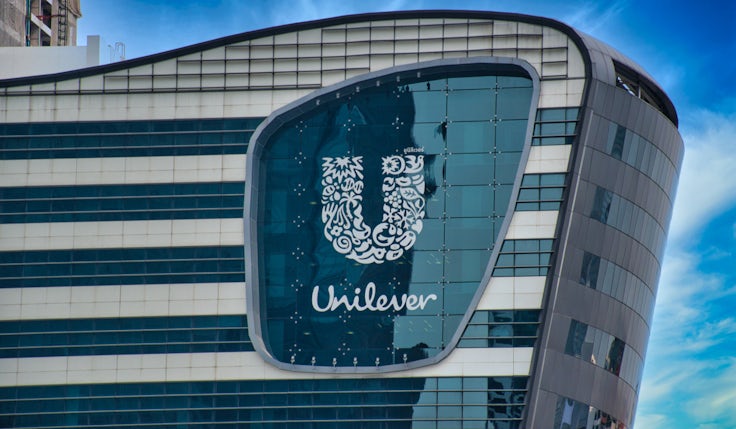Unilever’s personal care CMO on upskilling marketing for ‘social-first’ future
Moving from a focus on TV ads to an influencer-first strategy means Unilever is on a mission to upskill its marketing teams.
 Unilever is undergoing a marketing transformation as it moves to a social media and influencer-heavy strategy.
Unilever is undergoing a marketing transformation as it moves to a social media and influencer-heavy strategy.
The plan to put 50% of its marketing budget into influencers was first announced by CEO Fernando Fernandez in April, who said the company was prioritising the ‘4Vs’ of social media: variety of creators, volume, virality and velocity of content.
Nuria Hernandez, CMO of Unilever’s personal care division – which counts Dove and recent acquisition Dr Squatch in its portfolio – tells Marketing Week the statement made by Fernandez earlier this year was him “openly stating to the outside world something that is already happening within Unilever”.
However, she believes the CEO sent a “very clear message” to Unilever’s marketing teams about what the business is “expecting from them”.
“I was lucky enough to join my role when this transformation had already started, but was very much in the initial steps,” says Hernandez.
She became CMO at the end of 2023 after almost two years as general manager for the personal care division in Latin America.
‘Not just transactional’: Dove on the value of treating influencers as ‘strategic partners’
In total, she has spent almost 30 years at the business, after joining in 1997 as a research and development project manager. For a year and a half, she has been working with her marketers to “understand” what they need “to make the transformation happen”.
The focus has been on capability, tools and upskilling to ensure the change in marketing strategy “is not shocking to them”, Hernandez explains, but something they “embrace as an opportunity to learn and grow”.
“I would say that many of our more junior team members, they were very passionate about [social media] because this is what they do in their personal lives, and they were seeing that they can also use all their learning and experience to make it happen with their brands,” she adds.
Probably the biggest challenge for a company like Unilever, because of our size [is] changing the whole ecosystem on how we partner with our agencies, how we use technology, and how scale up on AI and other tools.
Nuria Hernandez, Unilever
For any business, undergoing a marketing transformation takes a lot of hard work. For a business of Unilever’s size, it’s a major undertaking.
“Probably the biggest challenge for a company like Unilever, because of our size [is] changing the whole ecosystem on how we partner with our agencies, how we use technology, and how scale up on AI and other tools that help make this very different work, which is much more complex,” she says.
Shifting to new ways of working is a “challenge” the team are still addressing, but Hernandez believes they are in “a very good place” compared to 18 months ago when the internal transformation began.
In terms of how the marketers now work, speaking “social-first, speaking about content creators, speaking about influencer marketing, is an everyday conversation”.
“It’s no longer something we want to do, but really something we are doing,” she adds.
Moving forwards
A fear of control and “understanding what we are doing is a mission” were reasons why Unilever was “not moving” forward, says Hernandez. In response to this fear, the FMCG giant has “developed very clear tools” to ensure it understands the return on investment from this “new way of doing marketing”.
“We now have tracking to understand the impact of all that on brand equity and how our brand long-term value is being created or not through all this,” she says.
The business is also looking closely at the short-term impact, Hernandez adds, from likes on posts to how much “fandom” its work is creating, and how people are engaging with the brands in their communities.
With this tracking in place, Unilever is adapting its channel mix from campaign to campaign, depending on what is resonating with different audiences.
Unilever’s CMO on using ‘creators’ voices’ to win over ‘sceptical’ consumers
There are “great” tools in place to ensure that within influencer marketing, Unilever can “read” the ROI and the brand creation value as much as it did “in the past”, she adds. This means an increased focus on data, tools, technology and AI.
“In the past, we were reading the impact of our one TV advertising campaign. Today, we are reading the value of 300 different assets operating in parallel on different channels,” Hernandez notes. “But still, we are able to read the performance of them and the value creation, and modify them at a speedy time to really ensure we are driving the return.”
This is something Unilever’s top marketer Esi Eggleston Bracey expanded on in Cannes last month.
“It is using creators’ voices to express the brand. It’s not a one off piece of creative any longer. At Unilever, I talk about we’re moving from that old model of a one-off broadcast to getting many people to communicate with many other people on your behalf. It’s the only way,” she said.
Regarding the global shape of the marketing function, Unilever wants to ensure it is “better connected than ever on global versus local”, says Hernandez.
“In many cases, culture happens at a local level and you need to ensure that you are empowering your local teams everywhere in the world to understand the brand well and be able to react to culture in a way that the brand wants to show up,” she adds.
Marketing Week will publish a follow-up interview with Hernandez about her career from general management to CMO and Unilever’s wider marketing strategy.






